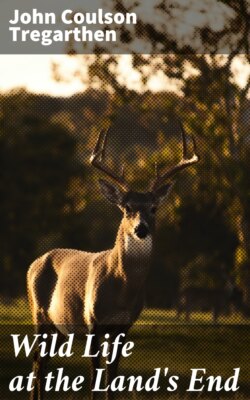Читать книгу Wild Life at the Land's End - John Coulson Tregarthen - Страница 17
На сайте Литреса книга снята с продажи.
ОглавлениеAt last he pitched on an ambush which seemed likely to favour his vigil if the otter should chance to come up, unless the moon should be clouded over, or the wind chop round when the sun went down.
It lay on the bank of the stream midway between the lake and the plantation, and from it he could command the otter’s line of approach. Let it not be thought, however, that he had no misgivings about his ability to confine the wily varmint to the lake, even should it pass him without suspecting his presence. No one is more familiar with its resources when danger threatens; but the sting of past failures and the wish to be even with the elusive creature, above all, his anxiety to provide sport for the hunt, urged him to attempt the almost impossible task he had set himself. No doubt some will say he was over zealous, and complain—and with some show of reason—that he did not engage a score of helpers, who could have formed a ring round the lake and at a given signal have made noisy demonstrations. Those who take this view would, of a surety, condemn him at once, did they but know the fame of “Maddern” men for beating tin cans when the bees are swarming.
The Earthstopper, it is true, did contemplate calling in their aid, only however to dismiss the idea from his mind; not because of any dearth of old kettles and pans, but through an experience of a year ago at Marazion Marsh, since which disastrous night—an otter broke through the line where two men lay asleep—he has “thought slight” of Gulval men, for all their skill in smelting tin and cutting early broccoli. But this tale must be chronicled elsewhere. There were, however, other allies on whom he felt that he could depend, and these he meant to make use of.
That afternoon, he paid a visit to Nute, the huntsman; and had you been standing by the smithy at the corner of the village street when the school children were going home, you would have seen Andrew coming with leisurely stride along the lane leading to the kennels, with a big lantern in each hand, and the mouth of a hunting-horn lifting the flap of the side pocket of his velveteen coat. He had learnt to blow that horn as a kennel-boy, when he was little bigger and less educated than the boys that crowded round and plied him with questions.
Good-natured, if evasive, were his replies about his use for the lanterns now that earthstopping was long over.
Slowly up the street past the chute, where a woman was filling a pitcher, went the group, getting smaller and smaller as the boys reached their doors, until Andrew and Vennie were alone as they took the footpath that led across the heather to his cottage.
Over “a dish o’ taa and a bit of saffern caake,” he amused his grandchild with a tale of his boyhood, recalled by a dent in the old horn he had placed on the table.
